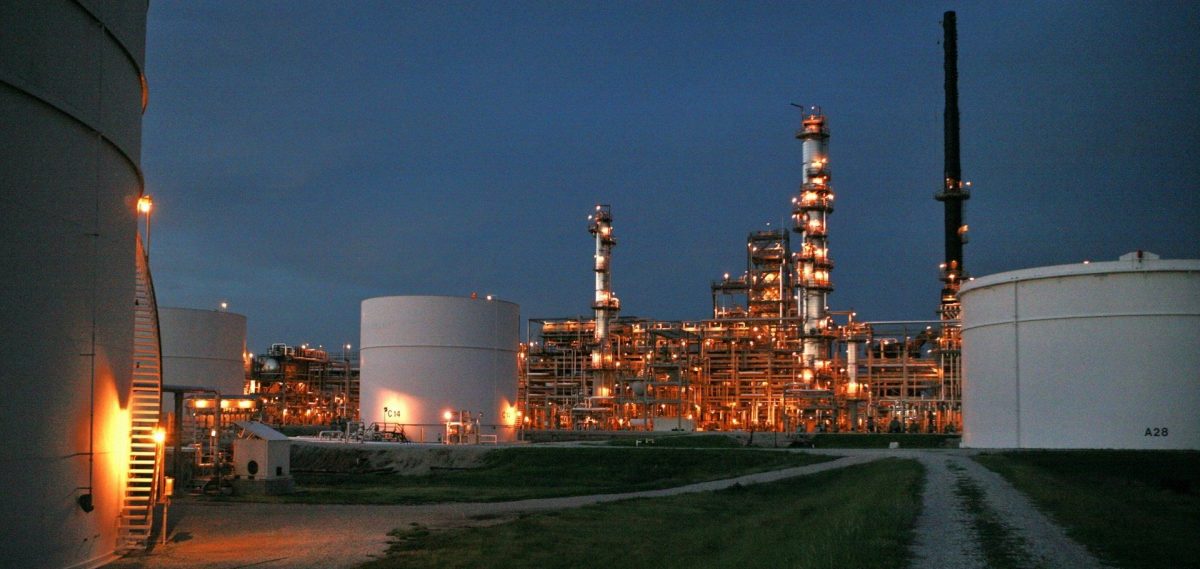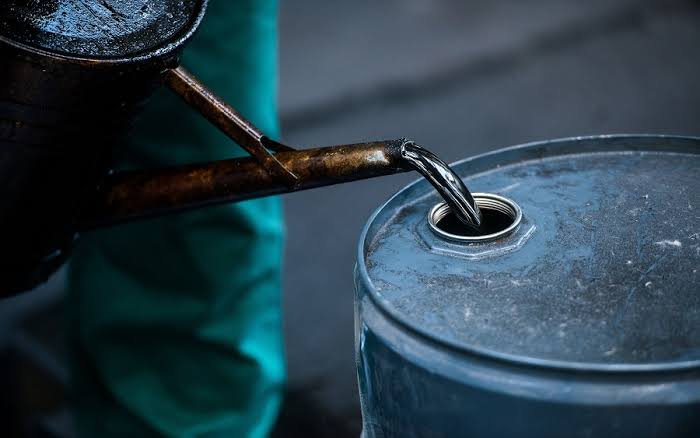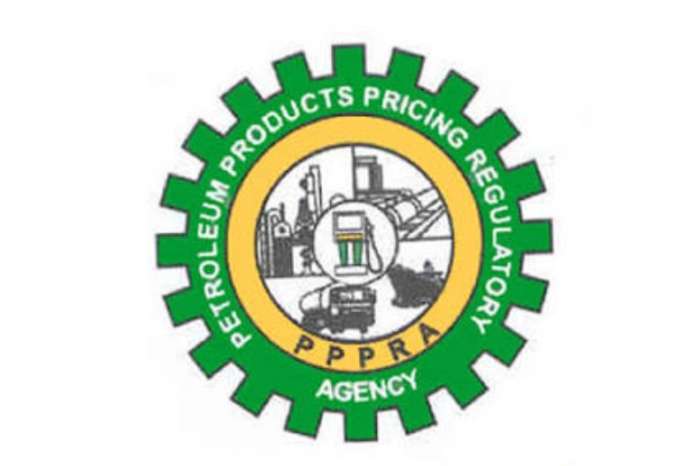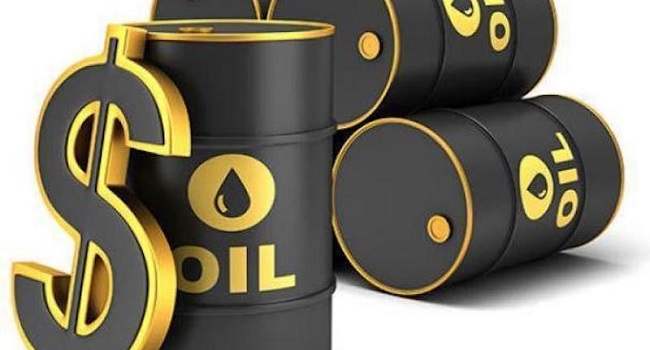AGO [/vc_column_text][/vc_column][/vc_row]PORT HARCOURT DEPOTDEPOT PRICEAVIDOR PH/NIPCO₦ 180.0SHORELINK BULK STRATEGIC PH₦ 185.0TULCAN/TSL₦ 185.0MASTERSLIQUID BULK₦ 179.5STOCKGAPNIPCO/SIGMUNDBULK STRATEGIC/NIPCOOVHCONOILSAHARA CALABAR DEPOTDEPOT PRICENORTHWEST₦183.0AMMASCOMAINLAND₦ 172.9SAMON PETFYNEFIELD₦ 173.0ALKANES₦ 173.0YSG (YOUNG SHALL GROW)₦ 175.0BLOKKS HYDEAZMAN/NIPCO₦183.0UGO HANNAH WARRI DEPOTDEPOT PRICERAINOIL OGHARANEPAL OIL & GAS / NNPC₦173.0PRUDENT OGHARA₦162.0MATRIX₦162.0CYBERNETICSTAURUS₦162.0OPTIMA₦161.0PINNACLEFRADRO₦ 165.0AYM SHAFA₦ 160.0 LAGOS DEPOTDEPOT PRICEAFRICA TERMINALS₦ 170.0IBACHEM₦ 170.0IBETO₦ 170.0MRS₦ 161.0LEIGHTEN PETINDEX₦ 168.0ETERNA₦ 170.0FOLAWIYO₦ 161.0OBATCHIPET₦ 170.0RAHAMANIYYAA ZNIPCO₦...
Fuel import: PPPRA engages central bank on forex for oil marketers
The Petroleum Products Pricing Regulatory Agency (PPPRA), Monday said it is engaging with the Central Bank of Nigeria (CBN) on ways to make foreign exchange accessible to private oil marketing companies seeking to import Premium Motor Spirit (PMS), also known as petrol, and other petroleum products.
In a statement in Abuja, Executive Secretary of the PPPRA, Mr. Abdulkadir Saidu, disclosed that the engagement with the CBN was aimed at determining the applicable Foreign Exchange rates for the importation of petroleum products and modality for accessing the applicable Foreign Exchange window by the Marketers.
He said, “This rate is reflected on the pricing template to determine the expected open market price of the product. This means that going forward, the guiding price to be advised, will be determined based on the rates quoted by CBN.
“The price is expected to guide the sale of PMS in Nigeria. In fact, we plan to extend the same pricing mechanism to Aviation Turbine Kerosene (ATK), Automotive Gasoline Oil (AGO), among others. The whole essence of the price band is to ensure price efficiency that is beneficial to both the consumers and oil marketers.”
Saidu maintained that the country’s existing refineries were expected to play key roles in the current fuel pricing regime, adding that the policy would also create immense opportunity for increased private sector participation in the industry.
He said, “The Nation’s refineries are required to key into the new pricing regime just like all other operators both private and public. The new regime will open up the Oil and Gas Sector for more private players and investments in refineries, storage facilities and transportation.
“At the end of the day we expect to see more private players operating in the industry. The liberalization of the entire industry will make it possible for private investors to recoup their investments, leading to a more vibrant downstream sector.
“However, in order for the nation’s refineries to continue producing fuels, the authorities in charge of the refineries need to fix the refineries and ensure they come back on stream at optimal level. We believe the upcoming Dangote Refinery and other modular refinery projects nationwide will be able to key into the new pricing regime.”
Saidu explained that the decision of the Federal Government to adopt the current PMS pricing regime was borne of the need to conserve scarce resources and the pressure the collapsing prices of crude oil in the international market brought on the revenue of the government.
He said, “Furthermore, the plunge in global crude prices made it increasingly difficult for Government to finance the 2020 National budget as it was predicated on a crude price of $57 per barrel. The low crude oil prices, therefore, presented the opportunity to address the lingering challenges associated with the Under/Over-Recovery regime and free up vital funds required to develop in other key sectors of the economy.
“Additionally, the new initiative is expected to stimulate private investment and growth in the downstream sector and encourage the resumption of products importation by Oil Marketing Companies, translating to more job creation as many depots and facilities that were dormant would now become active.”
The PPPRA chief executive added that: “What we have in place is a market reflective pricing system. Petroleum products prices will be adjusted in line with market realities and the result is what we see presently with prices on the downward slide. Accordingly, price will naturally be adjusted to reflect a true picture of market fundamentals at any particular period (high or low).
“The liberalized pricing regime will ensure a competitive and more efficient PMS market that guarantees reasonable returns to operators and ensure consumers pay appropriate prices in line with market reality and ensure they are not over-charged.”
Source: Today.ng
FG offers discounted crude oil below $4 amid glut
In a desperate effort to offload and sell stranded barges of oil, the Federal Government, yesterday, offered oil traders huge discounts on Nigerian crude oil grades below the $10 mark, as glut and energy imbalance triggered by the coronavirus hit the oil industry.
Latest prices for most of the government’s crude oil grades for sale in May, showed prices as low as $1.51 while two of Nigeria’s banner grades – Qua Iboe, and Bonny Light will sell at discounts of $3.92 and $3.95 respectively to Dated Brent next month.
Without refining capacity, Nigeria lacks the space to store unwanted supplies at a time the cost of hiring ships to take its supplies to importers has soared because many tankers are being used for floating storage.Advertisement
The discounts are coming after the Group Managing Director, Nigerian National Petroleum Corporation (NNPC), Mele Kyari, had painted a gloomy picture of the Nigerian economy in the months ahead, appealing to industry captains and Nigerians, to be prepared for very lean times.
According to him, the country has been unable to sell some of its cargoes of crude and liquefied natural gas.
For oil-dependent economies like Nigeria, the challenge of containing community spread amidst the pressure to re-open the economy that is largely informal leaves policymakers in a limbo.
Indeed, IEA’s latest Oil Market Report painted a dire portrait of global demand, but it nevertheless assumes that there is a resurgence in demand close to normal levels by the end of the year.Advertisement
But there are multiple reasons why the global economy may not return to anything close to “normal” even by the end of 2020.
Similarly, traders cautioned that the prices – $10 a barrel or less if the market doesn’t improve still may not tempt enough buyers because of the demand collapse triggered by the coronavirus.
The release of the Nigerian official selling prices was about a week late, while loading plans for June have started to emerge several days later than normal.
The nation’s exports of Qua Iboe crude oil for May, have been revised lower to 153,000 barrels a day (bpd) from the previously planned level of 215,000, while June’s shipments are set at 158,000bpd, according to loading schedules.Advertisement
The dire state of the oil market has meant that despite being so cheap – $50 or $60 a barrel would have been realistic just a few months ago – Nigerian barrels have been selling slowly.
Traders estimated that as of late last week, about 30 out of 65 May-loading cargoes still hadn’t been sold.
The coronavirus has halted swathes of the global transportation system, destroying demand for fuels in the process. Some estimates are that the reduction in demand could have been as big as 35 million bpd, or roughly 35% of global consumption.
Nigeria is one of the countries taking part in a global pact to limit oil production by 9.7 million bpd.
However, crude oil supply from OPEC members has soared by more than 2 million bpd in April to the highest levels since December 2018, oil-flow tracking company Petro-Logistics has said.
The highest OPEC supply in nearly a year and a half is being driven by record oil supply out of OPEC’s top producer and the world’s largest oil exporter, Saudi Arabia, and from the United Arab Emirates (UAE), according to Petro-Logistics.
source: guardian.ng
Oil prices rally as Nigerian crude sells below $10
Oil prices showed signs of recovery Wednesday morning, modestly reversing some of the losses posted this week after storage in the U.S. rose less than expected.
There are hopes that demand will go up as a couple of countries in Europe and some U.S. cities prepare to ease coronavirus lockdowns.
U.S. West Texas Intermediate (WTI) crude rose to a high of $14.40 per barrel, up by 15.4% or $1.90 at 03:33 West African Time.
The gain reduced the 27% fall it recorded in the first two days of the week.
Brent Crude, the benchmark for Nigeria’s oil grades, went up by 4.6% or 93 cents to $21.39 a barrel, further increasing the 2.3% gain posted on Tuesday.
But Financial Times reported Wednesday morning that the Nigerian National Petroleum Corporation was now offering cargoes of Bonny Light and Qua Iboe, two of Nigeria’s main grades, at nearly $4 per barrel below Dated Brent, or close to $10.
The crude inventories of the U.S. expanded by 10 million to 510 million barrels in one week to 24th April according to American Petroleum Institute compared to experts’ forecast of a 10.6 million build.
“It’s a little bit of good news that maybe storages aren’t filling quite as quickly in the U.S. as you would have thought,” said Lachlan Shaw, Head Commodity Research at National Australia Bank.
Regulators in Texas, U.S. biggest oil producer, are expected to vote on 5th May regarding whether to pursue an output cut. Officials in Oklahoma and North Dakota are also considering how to legally allow output cut.
It will increase production cuts of about 10 million barrels per day agreed by the Organisation of the Petroleum Exporting Countries and its Russia-led allies, or around 10% of world production expected to come into force on 1st May.
“The other thing coming through is more detail and a louder groundswell towards plans for removing COVID restrictions, particularly in Europe — in countries like Spain, France, Austria and Switzerland. That’s going to see demand pick up,” Mr Shaw said.
Credit rating agency, Moody’s reviewed its oil price forecast downward on Wednesday, projecting that the WTI would average $30 a barrel in 2020 and $35 in 2021 due to a global recession affecting fuel demand.
Moody’s said it envisaged abundant oil supply in storage to keep prices low through 2021.
source: Ripples Nigeria
30-04-2020
AGO [/vc_column_text][/vc_column][/vc_row]PORT HARCOURT DEPOTDEPOT PRICEAVIDOR PH/NIPCO₦ 180.0SHORELINK BULK STRATEGIC PH₦ 185.0TULCAN/TSL₦ 185.0MASTERSLIQUID BULK₦ 179.5STOCKGAPNIPCO/SIGMUNDBULK STRATEGIC/NIPCOOVHCONOILSAHARA CALABAR DEPOTDEPOT PRICENORTHWEST₦183.0AMMASCOMAINLAND₦ 172.9SAMON PETFYNEFIELD₦ 173.0ALKANES₦ 173.0YSG (YOUNG SHALL GROW)₦ 175.0BLOKKS HYDEAZMAN/NIPCO₦183.0UGO HANNAH WARRI DEPOTDEPOT PRICERAINOIL OGHARANEPAL OIL & GAS / NNPC₦173.0PRUDENT OGHARA₦158.5MATRIX₦162.0CYBERNETICSTAURUS₦162.0OPTIMA₦161.0PINNACLEFRADRO₦ 165.0AYM SHAFA₦ 160.0 LAGOS DEPOTDEPOT PRICEAFRICA TERMINALS₦ 170.0IBACHEM₦ 170.0IBETO₦ 171.0MRS₦ 161.0LEIGHTEN PETINDEXETERNAFOLAWIYOOBATCHIPETRAHAMANIYYAA ZNIPCO₦ 161.0AITEOAIPEC₦ 168.0SAHARA₦ 170.0EMADEB ENERGYA.A...
29-04-2020
AGO [/vc_column_text][/vc_column][/vc_row]PORT HARCOURT DEPOTDEPOT PRICEAVIDOR PH/NIPCO₦ 180.0SHORELINK BULK STRATEGIC PH₦ 185.0TULCAN/TSL₦ 185.0MASTERSLIQUID BULK₦ 179.5STOCKGAPNIPCO/SIGMUNDBULK STRATEGIC/NIPCOOVHCONOILSAHARA CALABAR DEPOTDEPOT PRICENORTHWEST₦183.0AMMASCOMAINLAND₦ 172.9SAMON PETFYNEFIELD₦ 173.0ALKANES₦ 173.0YSG (YOUNG SHALL GROW)₦ 175.0BLOKKS HYDEAZMAN/NIPCO₦183.0UGO HANNAH WARRI DEPOTDEPOT PRICERAINOIL OGHARANEPAL OIL & GAS / NNPC₦173.0PRUDENT OGHARA₦166.5MATRIX₦162.0CYBERNETICSTAURUS₦165.0OPTIMA₦164.0PINNACLEFRADRO₦ 165.0AYM SHAFA LAGOS DEPOTDEPOT PRICEAFRICA TERMINALS₦ 155.50IBACHEM₦ 156.0IBETO₦ 156.0MRS₦ 163.0LEIGHTEN PETINDEX₦ 156.0ETERNA₦ 156.0FOLAWIYO₦ 160.0OBATCHIPET₦ 156.0RAHAMANIYYAA ZNIPCO₦ 161.0AITEO₦...
Be ready to pay higher for fuel –PPPRA
Nigerians should be ready to pay high or low prices for petrol following the price liberalisation scheme currently in place, the Petroleum Products Pricing Regulatory Agency said on Monday.
The PPPRA is also engaging with the Central Bank of Nigeria to determine the applicable foreign exchange rates for the importation of petroleum products by oil marketers.
The agency’s Executive Secretary, Abdulkadir Saidu, said these while answering questions on the new PMS price regime in Nigeria.
He said, “What we have in place is a market reflective pricing system. Petroleum products prices will be adjusted in line with market realities and the result is what we see presently with prices on the downward slide.
“Accordingly, price will naturally be adjusted to reflect a true picture of market fundamentals at any particular period, high or low.”
He, however, noted that efforts were being made to develop alternative fuels to the PMS by deepening the utilisation of Liquefied Petroleum Gas/Compressed Natural Gas as auto gas in Nigeria.
Saidu said this would come into fruition in the medium term and would help to cushion the effect in case of a situation of high oil price.
On what the PPPRA was doing to ensure that marketers get forex at the official rate to promote price affordability, he said the agency was working with the CBN on this.
Saidu said, “The agency is engaging with the CBN to determine the applicable forex rates for the importation of petroleum products and modality for accessing the applicable forex window by marketers.
“This rate is reflected on the pricing template to determine the Expected Open Market Price of the product. This means that going forward, the guiding price to be advised will be determined based on the rates quoted by the CBN.”
The PPPRA boss said the price would guide the sale of the PMS in Nigeria, adding that the agency planned to extend the same pricing mechanism to kerosene, diesel and others.More in Home
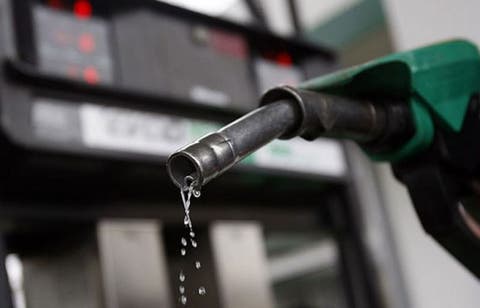
Saidu noted that the essence of the price band was to ensure price efficiency that would be beneficial to both consumers and oil marketers.
He explained that the market-based pricing regime came into effect on March 19 following government’s approval for the adjustment of PMS price from N145 to N125/litre.
“Going forward, pricing of the PMS will reflect market fundamentals. The PPPRA will continue to monitor price trends and advise monthly guiding price for all petroleum products, based on prevailing market realities and other pricing fundamentals,” he stated.
Saidu explained that the recent plunge in oil price occasioned by the outbreak of COVID-19 and slowing global oil demand had a direct bearing on the EOMP of petrol, pushing it to a level below the pump price cap of N145/litre.
This, he said, made the government to order the Nigerian National Petroleum Corporation to review downward its ex-coastal price of petrol.
Saidu said, “Furthermore, the plunge in global crude prices made it increasingly difficult for government to finance the 2020 national budget as it was predicated on a crude price of $57 per barrel.
“The low crude oil prices, therefore, presented the opportunity to address the lingering challenges associated with the under/over-recovery regime and free up vital funds required to develop other key sectors of the economy.”
He said the new initiative would also stimulate private investment in the downstream sector and encourage the resumption of products importation by marketers, a development that would revive many dormant depots.
Saidu stated that under the new regime, PPPRA would continue to carry out all its mandates such as determining the pricing policy of petroleum products and regulating the supply and distribution of products.
He expressed optimism that the upcoming Dangote Refinery and other modular refinery projects nationwide would be able to key into the new pricing regime.
Copyright PUNCH.
28-04-2020
AGO [/vc_column_text][/vc_column][/vc_row]PORT HARCOURT DEPOTDEPOT PRICEAVIDOR PH/NIPCO₦ 180.0SHORELINK BULK STRATEGIC PHTULCAN/TSL₦ 185.0MASTERSLIQUID BULK₦ 185.0STOCKGAPNIPCO/SIGMUNDBULK STRATEGIC/NIPCOOVHCONOILSAHARA CALABAR DEPOTDEPOT PRICENORTHWEST₦183.0AMMASCOMAINLAND₦ 172.9SAMON PETFYNEFIELD₦ 173.0ALKANES₦ 173.0YSG (YOUNG SHALL GROW)₦ 175.0BLOKKS HYDEAZMAN/NIPCO₦183.0UGO HANNAH WARRI DEPOTDEPOT PRICERAINOIL OGHARANEPAL OIL & GAS / NNPC₦173.0PRUDENT OGHARA₦166.5MATRIX₦162.0CYBERNETICSTAURUS₦165.0OPTIMA₦164.0PINNACLEFRADRO₦ 165.0AYM SHAFA LAGOS DEPOTDEPOT PRICEAFRICA TERMINALS₦ 156.0IBACHEM₦ 158.0IBETO₦ 158.0MRS₦ 163.0LEIGHTEN PETINDEX₦ 156.0ETERNA₦ 156.0FOLAWIYO₦ 160.0OBATCHIPET₦ 156.0RAHAMANIYYAA ZNIPCO₦ 161.0AITEO₦ 160.0AIPEC₦...
27-04-2020
AGO [/vc_column_text][/vc_column][/vc_row]PORT HARCOURT DEPOTDEPOT PRICEAVIDOR PH/NIPCO₦ 180.0SHORELINK BULK STRATEGIC PHTULCAN/TSL₦ 185.0MASTERSLIQUID BULK₦ 185.0STOCKGAPNIPCO/SIGMUNDBULK STRATEGIC/NIPCOOVHCONOILSAHARA CALABAR DEPOTDEPOT PRICENORTHWEST₦183.0AMMASCOMAINLAND₦ 172.9SAMON PETFYNEFIELD₦ 173.0ALKANES₦ 173.0YSG (YOUNG SHALL GROW)₦ 175.0BLOKKS HYDEAZMAN/NIPCO₦183.0UGO HANNAH WARRI DEPOTDEPOT PRICERAINOIL OGHARANEPAL OIL & GAS / NNPC₦173.0PRUDENT OGHARA₦165.0MATRIX₦165.0CYBERNETICSTAURUS₦165.0OPTIMA₦164.0PINNACLEFRADRO₦ 165.0AYM SHAFA LAGOS DEPOTDEPOT PRICEAFRICA TERMINALS₦ 156.0IBACHEM₦ 156.0IBETO₦ 156.0MRS₦ 163.0LEIGHTEN PETINDEX₦ 156.0ETERNA₦ 156.0FOLAWIYO₦ 160.0OBATCHIPET₦ 156.0RAHAMANIYYAA ZNIPCO₦ 161.0AITEO₦ 160.0AIPEC₦...
Twelve New Facts to Know About Current Oil Market, Price
What is the current market price of Nigeria’s Bonny Light?
The price of Bonny Light, Nigeria’s premium oil grade is currently hovering at $16.94 per barrel in the international market.
Why the sudden rise in price, barely a week after it had dropped to as low as $5.30 per barrel?
The price is mainly driven by ‘artificial demand’ caused by efforts of some countries, especially China and United States to stockpile cheap oil for various purposes.
Why are these countries stockpiling the cheap oil?
Oil can be stockpiled for many reasons, including business and building of strategic reserves, which could be utilised to meet future demand or even released into the market to achieve pre-determined national interest.
How comfortable is the Federal Government of Nigeria with the current price?
No, it is not, apparently because the 2020 budget was first benchmarked on $57 and 2.3 million barrels per day, mb/d output, and later reduced to $30 and 1.42 mb/d because of the negative impact of Coronavirus pandemic. Relevant government agencies are currently watching and looking forward to a possible leap in price.
Will it ever rise to the $30 and above?
Certainly, it will not be within a very short period because of the impact of the pandemic. Nevertheless, oil price could hit $30 and above when a lasting solution would have been found to the pandemic.
Should we expect oil price to ever hit the pre-pandemic $60 regime?
As far as the pandemic remains, it would not be possible for the price to rise to that level. However, it is a possibility much later when major oil consuming countries, including China, accounting for about one third of the global demand growth would have completed the process of rebuilding their economies.
Can you provide further explanation?
The pandemic culminated in the shutdown of the domestic economies of many nations as well as global economy, which are mainly driven by oil-related fuels. This means that to reverse the trend, we need to conquer it before restreaming operations in many sectors, including manufacturing, transportation, agriculture, tourism, banking, education and Real Estate that oil-related fuels for operations. It is the collective activities in these and other sectors at the post COVID-19 era that would determine demand, and by extension oil price.
Why can’t the Organisation of Petroleum Exporting Countries, OPEC, which Nigeria is a member fix the price to enable its members make more money?
The organisation cannot fix price because other countries, other than its members, such as United States and Russia also produce and export commercial oil to the global market.Close
Why can’t OPEC members embark on a ‘deep oil cut’ in order to cause shortage, thus influencing price?
It cannot do that because it is not a cartel. In other words, non-OPEC producers also control much oil, meaning that the cooperation of all stakeholders is key.
With its ‘minor cuts’ do we still have much excess oil in the market?
Yes, we still have much excess oil left in the market, despite the decision of OPEC members to adjust downwards their overall crude oil production by 9.7 mb/d, starting on 1 May 2020, for an initial period of two months that concludes on 30 June 2020.
However, the situation can change in the coming months. Remember, OPEC had also decided for the subsequent period of six months, from 1 July 2020 to 31 December 2020, to cut 7.7 mb/d, which will be followed by a 5.8 mb/d adjustment for a period of 16 months, from 1 January 2021 to 30 April 2022.
What should Nigeria and others do to support OPEC at this time?
First, Nigeria should respect its OPEC quota as provided by OPEC. Second, Nigeria and others should also work with OPEC, currently engaging with relevant stakeholders, including non-OPEC producers and consumers for a reason. Everyone is important.
As a nation, what should Nigeria be planning to do as part of its post COVID-19 economic reconstruction programme?
The government needs to be less dependent on using the price of oil to define its budget. It should take practical steps in rebuilding its economy away from oil.
Vanguard
Read the original article on Vanguard.
